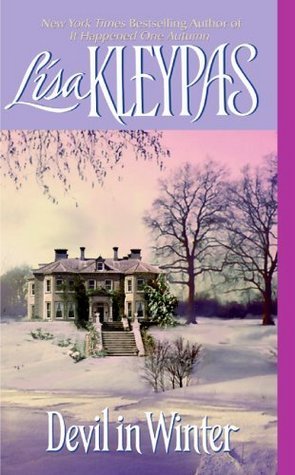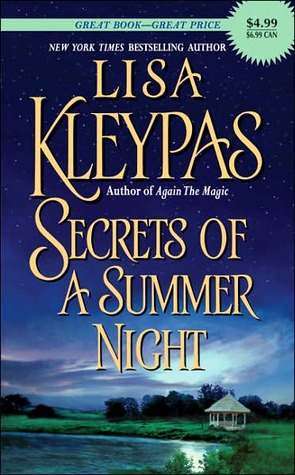 Devil in Winter Summary:
Devil in Winter Summary: A Devil's Bargain
Easily the shyest Wallflower, Evangeline Jenner stands to become the wealthiest, once her inheritance comes due. Because she must first escape the clutches of her unscrupulous relatives, Evie has approached the rake Viscount St. Vincent with a most outrageous proposition: marriage!
Sebastian's reputation is so dangerous that thirty seconds alone with him will ruin any maiden's good name. Still, this bewitching chit appeared, unchaperoned, on his doorstep to offer her hand. Certainly an aristocrat with a fine eye for beauty could do far worse.
But Evie's proposal comes with a condition: no lovemaking after their wedding night. She will never become just another of the dashing libertine's callously discarded broken hearts—which means Sebastian will simply have to work harder at his seductions... or perhaps surrender his own heart for the very first time in the name of true love.
Devil in Winter Review:
I initially read this book, and absolutely loved it. But re-reading It Happened One Autumn, framed St. Vincent differently. I love when authors create characters that push the boundaries of morality and try and make the audience sympathize with them because it pushes us to understand the reason behind their actions. However, St. Vincent's reasoning was hard to grasp and his actions were wrong. Ms. Kleypas did try and give some back story into him, but it was just a short sentence. It didn't really reveal his personality as much as it needed to. Usually, the Wallflower and Hathaway books don't focus too much on the past, a lot is spent on developing their future relationships. This works for everyone else; however, St. Vincent needed to be redeemed. A hint of the past is not enough to prove that St. Vincent is intrinsically a good person and deserves forgiveness.
St. Vincent, without context, was your typical rake. He was arrogant, good-looking, great at making money and just living up to that stereotype. Not that it's a bad thing, especially in romance! It's just that Evie's past was explored so much more, and St. Vincent's was glossed over when he needed the most exposure. As a standalone, he was a classic book boyfriend, as a continuation of a series he was lacklustre. There was a moment where St. Vincent apologized for his actions, but he only did "on screen" to Westcliff, not Lillian. The person that he kidnapped and assaulted! In that regard, the book felt unfinished. And his actions tainted every part of the book. He came off as over-aggressive, especially with his language towards Evie in the beginning, too masculine, too arrogant, etc. The bullet wound was a nice touch, but it just wasn't enough. I'm going to keep repeating this, had it been any other series, this book would have been spectacular! It was why I loved it before I re-read It Happened One Autumn through a new perspective. Reading Devil in Winter before It Happened One Autumn definitely reads better.
On the other hand, Evie was a sweetheart throughout the novel. Her going from a blushing, shy girl to a confident woman was amazing to see. It was a slow progression, and the book ends with room for more growth. I would have loved to read even more about her life and her journey. And her backbone! From the very beginning, she was so strong; it's so interesting to see a heroine that isn't upfront about her strength. She knows when to push for something and when to back down, especially after Lillian and so many of the Urban Fantasy novels, it was refreshing. In terms of side characters, Cam was interesting. Daisy and Annabelle were great to see as well!
Overall this was a 2-start read, but it used to be a five.
On the other hand, Evie was a sweetheart throughout the novel. Her going from a blushing, shy girl to a confident woman was amazing to see. It was a slow progression, and the book ends with room for more growth. I would have loved to read even more about her life and her journey. And her backbone! From the very beginning, she was so strong; it's so interesting to see a heroine that isn't upfront about her strength. She knows when to push for something and when to back down, especially after Lillian and so many of the Urban Fantasy novels, it was refreshing. In terms of side characters, Cam was interesting. Daisy and Annabelle were great to see as well!
Overall this was a 2-start read, but it used to be a five.


